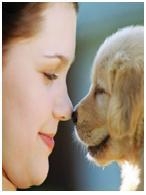Puppies and Swine Flu

I’ve had a hard time filling my classes lately, so I started doing some investigating. While there were many reasons for people not going to class right now, the H1N1 scare was mentioned more frequently than anything else.
I’m one to generally not get all worried about such things, take some common sense precautions and go on with life. However, I do understand a little better some of the hyper-cautiousness of some of my clients this time around because of my own situation. I have one daughter who is high-risk because she is under 25, and she’s attending a large college full of others her age. My other daughter is just 25 and she’s pregnant. My husband is an insulin dependent diabetic. So, with all these potential risks for a more serious result upon contracting the flu, I am being careful!
That said, I am also worried about those puppies and adolescents whose socialization might be cut short due to this human health concern. We already know that there are ample excuses for not socializating our puppies and dogs. If it weren’t already a problem, Dr. Dunbar wouldn’t have written about the Common Excuses for Not Socialization Your Puppy.
I certainly don’t want anyone to take risks that might jeopardize their health. However, when it comes to puppies, lack of socialization is often a death sentence. While we MIGHT get the flu if we’re not careful, our puppies absolutely WILL suffer from a lack of socialization.
So, I would say we handle this in the same way we’ve always handled the potential risk of puppy illness. We take all the necessary precautions to avoid what might happen, in order to continue the work of preventing what will happen!
Puppy class instructors are already quite familiar with keeping things clean and as germ/disease free as possible. In fact, most of us have always had plenty of hand sanitizer in our training areas! Since we instructors need to stay healthy, too, you can bet we’re already paying extra attention to surfaces that human’s touch, as well as the dogs. Your potential instructor should be able to explain to you their cleaning/sanitation procedures.
Students simply need to do what they’re probably already doing. Don’t come to class if you’re sick. Cover your coughs and sneezes. Wash hands often and use hand sanitizer.
Maybe instructors will have to provide more options for make-up classes in the case of illness. Maybe kids will need some extra supervision and direction in class. Maybe those in high risk groups will have to find someone else to take their puppy to class, or wait to get a new puppy until they are in a position to provide for proper socialization.
My fear is that when the flu season has passed, I will be blogging endlessly about the flood of under-socialized adolescent dogs coming through my doors. Of course, only the lucky will come through my doors, the others will be going through shelter doors.




